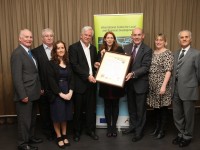Topic: Research, training and technical assistance in the Irish Border Region
Sponsor: International Centre for Local and Region Development (ICLRD), European Union Interreg IVA Programme, International Fund for Ireland, Higher Education Authority
Project Duration: 2006-Present
The Institute is closely involved in ICLRD’s programs in applied research, executive training, conferences and technical workshops and technical assistance to local authorities in the Irish border region. Selected examples are noted below:
Managing Cross-Border River Basins and Integrating Spatial Planning at the Watershed ScaleThere are eight river basins on the island of Ireland, three of which are cross-border. The management of these river basins and an understanding of the impacts of development and economic activities on water quality offer opportunities for cross-border cooperation. Working with a larger ICLRD team in 2011, Linda Shi, Kendra Leith and John Driscoll have:
- Documented best practices in river basin management in the United States and Europe, including regional cooperation across administrative boundaries.
- Developed a case study on the role of the Pioneer Valley Planning Commission in Western Massachusetts in bringing together State and local governments to reduce the long-term impact of development on water quality in the Connecticut River.
- Organized an international training seminar for how Ireland and Northern Ireland can improve joint management of their shared river basins.
One consequence of the current economic crisis is a greater willingness to consider shared services among local authorities and across communities. As part of a larger ICLRD study on shared services, John Driscoll, Linda Shi and Kendra Leith have documented how best practices in shared services in the United States could be applicable in the Irish context. Karen Keaveney, an I2UD senior research associate from Queen’s University Belfast is also part of the shared services study team. This research has been presented in three reports covering international experiences in local government shared services and propositions for local government collaboration in the Irish border region. The Institute has also collaborated with partners to develop a web portal resource for local governments to learn more about shared services and collaborate through pilot projects.
New Models for Cross-Border CooperationDeveloping new models of cross-border cooperation, especially for border regions where the legacy of conflict and back-to-back development impedes development of the region has been a focus of ICLRD research. Francois Vigier and John Driscoll have worked with ICLRD research teams to develop three research studies whose findings and recommendations have been incorporated into spatial planning and regional development policies and initiatives for the island of Ireland and in particular the Irish border region. These include:
- Spatial Strategies on the Island of Ireland: Development of a Framework for Collaborative Action (2006)
- The Newry-Dundalk Twin-City Region: Supporting the Implementation of Cross-Border Collaborative Frameworks (2009)
- Developing a Strategic Alliance between Newry and Mourne District Council and the Louth Local Authorities (2010)
Working within functional urban regions that include multiple local governments and international boundaries presents both challenges and opportunities for cooperation. As part of a series of case studies by ICLRD, the Institute was involved in documenting good practice for the following studies:
- The Basel Metropolitan Area: Three Borders – One Metropolitan Area (2010)–John Driscoll, Francois Vigier, Kendra Leith. This study focuses on the Trinational Eurodistrict Basel (TEB), a region with strong cross-border functional linkages and a history of developing joint projects and co-ordination mechanisms.
- Regional Planning in the Boston Metropolitan Area (2010)–James Kostaras, François Vigier, John Driscoll. With its focus on the greater Boston Area, this case study provides practitioners, policy makers and academics involved in cross-border and inter-jurisdictional cooperation with practical examples of how cooperation, in local and regional development, can be shaped by collaborative efforts.
- Collaborative Communities: Co-operation among Rural Municipalities – Insights from Spain (2011). The report considers the Mancomunidades in Spain, voluntary associations of municipalities who cooperate among themselves to deliver services in an effective and cost-efficient manner. John Driscoll and Kendra Leith assisted the lead author, Brendan O’Keeffe.
In a recent survey in the Republic of Ireland, the government estimates there are 1,655 unfinished housing developments with substantial construction works outstanding. In Northern Ireland, while the number of unfinished housing estates is less of an issue, there is land that is zoned for housing or commercial development that has no foreseeable market. Through ICLRD, the Institute has been involved in the following initiatives:
- Organizing and presenting in workshops with key public and private sector participants on how central and local governments and social housing developers can develop successful affordable housing programs on under-utilized land.
- Conducting study tours of Boston housing programs for senior government officials
- Working with the Harvard Business School to document lessons learned learn from past housing crises in the U.S. (the Resolution Trust), Sweden and Japan
Just as in much of Europe and North America, Northern Ireland and the Republic of Ireland have developed new policies to counteract some of the perceived failures of earlier housing policies by improving conditions in existing housing estates and providing new mechanisms for delivering subsidized housing.
John Driscoll and Erick Guerra of the Institute were part of a larger ICLRD project that documented initiatives and policies in Northern Ireland and the Republic of Ireland to improve and build subsidized housing in mixed communities through the lens of six case studies – Springfarm, the Irish Street and Gobnascale interface and Carran Crescent in Northern Ireland and Cranmore, Mahon and Adamstown in the Republic of Ireland.
Back to Projects

